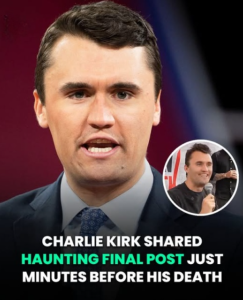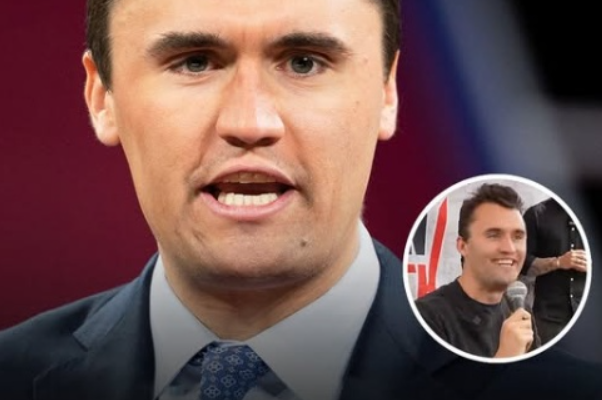Just hours before his tragic assassination at Utah Valley University on September 10, 2025, Charlie Kirk—conservative activist, founder of Turning Point USA, and prominent voice among young American conservatives—posted a final message that now reads like a chilling prelude to his death. It was not a farewell, not a reflection, but a call to action. A warning. A plea.
His final post on X (formerly Twitter) addressed the brutal murder of Iryna Zarutska, a 23-year-old Ukrainian refugee who had been fatally stabbed on a Charlotte light rail train just weeks earlier. Kirk’s words were sharp, urgent, and politically charged:
“If we want things to change, it’s 100% necessary to politicize the senseless murder of Iryna Zarutska because it was politics that allowed a savage monster with 14 priors to be free on the streets to kill her”.
He shared a video of White House Press Secretary Karoline Leavitt discussing the case, underscoring his belief that systemic failures in the criminal justice system were enabling repeat offenders to commit horrific acts. Kirk’s message was not just commentary—it was a rallying cry. And then, within hours, he was dead.
A Message Wrapped in Warning
Kirk’s final post was emblematic of his style: direct, provocative, and deeply rooted in his belief that political action was the only path to justice. He had long argued that the criminal justice system was broken, that leniency toward repeat offenders endangered innocent lives. In this case, the suspect in Zarutska’s murder, Decarlos Brown Jr., had 14 prior offenses and was charged with first-degree murder and a federal terrorism-related offense.
Kirk’s decision to spotlight Zarutska’s case was not random. It was part of a broader narrative he had been building—one that painted political inaction as complicity. His followers saw him as a truth-teller, someone unafraid to name names and demand accountability. His critics saw him as incendiary. But no one could deny the impact of his voice.
The Tragedy That Followed
Later that day, Kirk took the stage at Utah Valley University for the first stop of his “American Comeback Tour.” The event was held outdoors, beneath a tent, with thousands of students gathered to hear him speak. He was seated at a table branded with the slogan “Prove Me Wrong,” engaging in a spirited debate about mass shootings.
A student asked, “Do you know how many transgender Americans have been mass shooters over the last 10 years?” Kirk replied, “Too many,” drawing applause. The student followed up: “Do you know how many mass shooters there have been in America over the last 10 years?” Kirk responded, “Counting or not counting gang violence?”
Those would be his final words.
A single gunshot rang out. Kirk clutched his neck and collapsed backward in his chair. Blood pooled beneath him as the crowd screamed and scattered. The bullet had come from the rooftop of the Losee Center, roughly 200 yards away. The shooter remains at large.
Echoes of a Warning
The timing of Kirk’s final post has led many to see it as prophetic. He spoke of political violence, of systemic failure, of the need to confront uncomfortable truths. And then he became a victim of the very chaos he warned against.
His message about Zarutska’s murder was not just about one woman—it was about a pattern. A system. A society that, in his view, had lost its moral compass. Kirk believed that silence was complicity, and he urged his followers to speak out, to politicize, to demand change.
Now, his own death has become politicized. President Donald Trump called Kirk “The Great, and even Legendary,” and blamed “radical left political violence” for the assassination. Others have pointed to the lack of security at the event, questioning how a public figure could be so vulnerable.
The Emotional Undercurrent
For those who knew Kirk personally, the final post was not just political—it was deeply personal. He was a husband, a father of two young children, and a man of faith. His wife, Erika Kirk, had posted Psalm 46:1 earlier that morning:
“God is our refuge and strength, a very present help in trouble”.
The verse, paired with Kirk’s final message, now reads like a spiritual bookend to a day of tragedy. Erika’s post has become a digital memorial, a place where thousands have gathered to mourn, pray, and reflect.
A Legacy of Provocation and Purpose
Charlie Kirk’s legacy is complex. He was a polarizing figure, beloved by many and criticized by others. He founded Turning Point USA at just 18 years old, building it into a national movement that energized conservative youth. He hosted “The Charlie Kirk Show,” appeared on Fox News and CNBC, and became a fixture on college campuses.
But it is his final message that may define him most. It was not a farewell—it was a challenge. A demand for accountability. A call to politicize tragedy not for gain, but for change.
In the hours after his death, his post was shared thousands of times. Supporters saw it as a warning ignored. Critics saw it as inflammatory. But all agreed: it was haunting.
Searching for Meaning
In moments like these, the nation turns to ritual. Vigils. Moments of silence. Scripture. The New York Yankees held a moment of silence before their game against the Detroit Tigers, displaying Kirk’s image on the jumbotron with the words “Remembering Charlie Kirk”. Tributes poured in from across the political spectrum, from President Trump to Arnold Schwarzenegger to Chris Pratt.
But beneath the tributes lies a deeper question: What does it mean when a man’s final words are a warning—and that warning is followed by his death?
Is it coincidence? Fate? Or something more?
The Road Ahead
As investigators continue their search for the shooter, Kirk’s final message remains etched in the public consciousness. It is a reminder of the fragility of life, the urgency of truth, and the power of words.
Charlie Kirk did not die quietly. He died mid-sentence, mid-debate, mid-mission. His final post was not a whisper—it was a shout. And now, it echoes.


